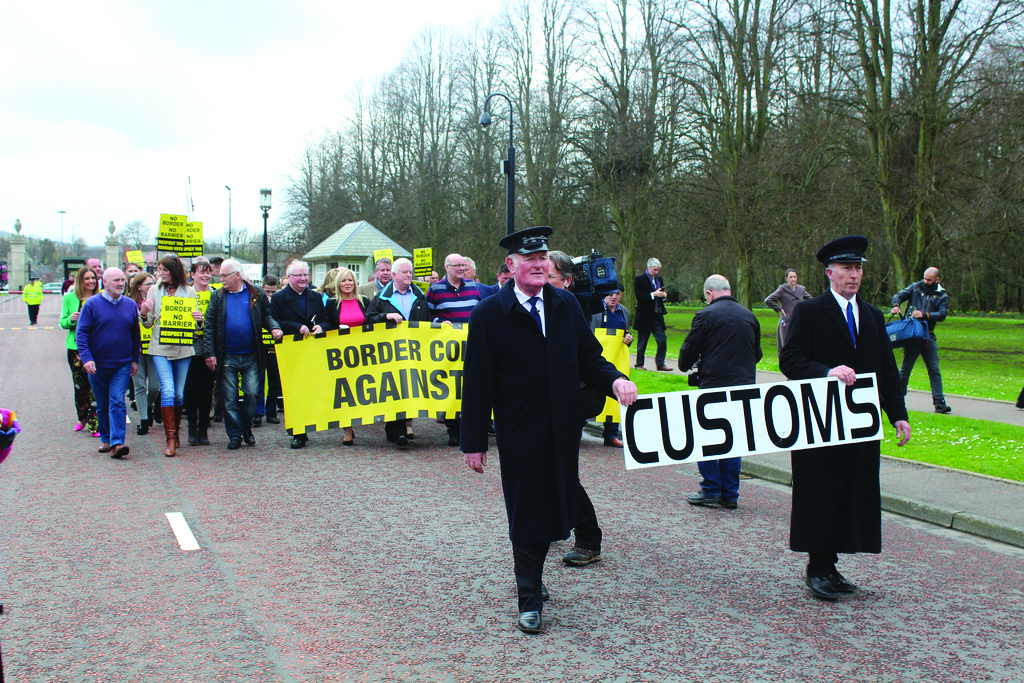I would venture to say there was not a dry eye in sitting rooms across Ireland, as the poignant scenes of the final episode of Derry Girls aired last month. While this generation has grown up in the reconciliation era of the Good Friday Agreement, the horror of violence juxtaposed with the ordinariness of teenage life was all too familiar to Irish audiences, calling to mind the realities of a not so distant past.
In recent weeks, lawmakers in Ireland, the United Kingdom and the European Union have been interpreting the European Commission’s joint report on the UK’s withdrawal from the EU published last December. The joint report affirms the necessity of protecting the values of the 1998 Good Friday Agreement “in all its parts,” and has reiterated the UK’s “commitment to the avoidance of a hard border, including any physical infrastructure or related checks and controls”.
Yet we have heard in recent weeks from Minister of Foreign Affairs, Simon Coveney, that the possibility of a hard border with customs checks is not off the table. How will the UK’s removal from the European customs union thus operate on a ground level, moreover on an island where painful histories loom so large in popular memory that they transcend into popular culture?
From a purely economic point of view, building and maintaining a hard border with custom checks will be costly. It will be more time consuming for producers or business owners to ferry their goods across the border, and for visitors to take a day trip to Belfast. The consequences of a hard border run far deeper than the inconvenience of having to open your car boot or declaring to a border agent if you have citrus fruit in your packed lunch.
From a historian’s or political scientist’s perspective, hard borders can be, and have been, significant instruments in nation building and forging identities. It is the symbolic weight of the border that could threaten to quash the relative peace that individuals and communities have slowly been building since the Good Friday Agreement.
As a Canadian living in Ireland, I see similarities in the way Irish and Canadian national identities have historically been defined. Canadians have used their Southern neighbour as a foil for true Canadian spirit, while the Irish have also highlighted their native culture in contrast to that of their more influential neighbour.
In a North American context, there was no officially delineated border between Canada and the United States, nor was there such thing as a Canadian or American national identity, before the War of 1812. Yet the consequences of this conflict have been far-reaching if we consider the distinct national identities that are now entrenched in global consciousness, and the border, complete with customs checks, that is a feature of life in North America over two hundred years on. However, the War of 1812 is old news, and you’d be hard pressed to find a Canadian citizen who can explain much of the conflict beyond what they learned in grade four.
I don’t need to point to the emotion stirred up by Derry Girls in February to prove that Ireland is nowhere near that level of safe historical distance when the Troubles or the Good Friday Agreement are brought up. Furthermore, the situation on this island is marked by an unparalleled heterogeneity of communities and complex identity politics. Would a hard border be the first step in a new era of nation-building for Northern Ireland? I would argue that it would instead exacerbate underlying tribalism in a territory that would neither be entirely Irish, nor British, nor European.
The way history is told matters greatly in a post-conflict era. The Ulster Museum, an institution which has engaged in cross-border and cross-community initiatives, emphasises that although people of various identities across Northern Ireland may not share the same memories of the past, they do share a history. Community archaeology projects across Northern Ireland have allowed people from different communities to shed preconceptions in order to work shoulder to shoulder, and to find common ground in shared ancient history. In these cooperative projects, history not only gives voice to diverse narratives, but also highlights commonalities.
In the process of nation-building, borders undoubtedly influence the way national histories, especially those of war and conflict, are written and remembered. The progress that has been made in building a peaceful and tolerant Northern Ireland in the twenty years since the Good Friday Agreement could be a thing of the past as divisive and sectarian histories re-emerge around a hard border. We must be wary of such divisions.







